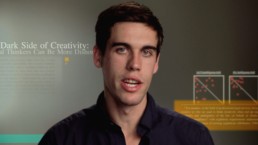Review: ‘(Dis)Honesty’
Behavioral economist Dan Ariely explores the rationalization of truth-telling in this heady documentary.
The human mind is a curious and complex thing, and in director Yael Melamede’s documentary (Dis)Honesty, she enlists the knowledge of behavioral economist Dan Ariely to uncover the truth behind our lies, and the impact it has on society. Candid interviews from ordinary people whose lives have been ruined by dishonesty are sprinkled throughout the film, and their self-reflection and relatability adds a powerful element to the stories they tell. It’s no secret that everyone tells a little white lie now and again, but after watching (Dis)Honesty, you may want to re-think how that little fib can easily lead to a bigger, more consequential lie down the road.
Dan Ariely orchestrates the film from the very beginning. A professor at Duke University, Ariely founded the Center for Advanced Hindsight and with three New York Times bestsellers on the subject, he is the man responsible for conducting hundreds of experiments to understand this human behavior. His journey began tragically when, as a teenager, Ariely suffered severe burns to over half of his body which left him hospital bound for three years. During this time, he noticed all of the irrationalities occurring in daily life and turned his tragedy into his life’s mission to understand human behavior, specifically dishonesty.
The take away is that we all have the capacity to build a better and more honest world, and this film can help us get there.
(Dis)Honesty plays like a 90 minute TED Talk, Ariely gives his presentation to a group of curious minds on the subject of lies, as the film intercuts from his speech to the stories from eight different people. Athletes, scholars, stock traders and stay-at-home mothers make up the diverse cast of characters, and while their stories are all very different, they share a commonality in the deeply human experience of guilt, shame, and repentance.
One of the better-known stories comes from media strategist and writer Ryan Holiday. Holiday, pictured above, is responsible for orchestrating the Tucker Max media freak-out back in 2009. For those unfamiliar, Tucker Max started as a blog which famously morphed into the scandalous book, and later movie, I Hope They Serve Beer In Hell. To strum up publicity for the film, Holiday started a guerrilla marketing campaign to self-sabotage his own film, figuring that negative press would drive more people to the seats. He would deface the film’s billboards, and then report it to various outlets, sparking interest and eventually starting a wide-spread movement lashing out against Beer In Hell. His story is one of the eight that are both engaging and entertaining. Side note- Holiday now works as the head PR at American Apparel.
Corporate scandals and political deception are obviously major no-no’s, but what about the little lies that aren’t seemingly so bad? Like telling a child about the existence of Santa Claus, for example. There is a gray area when it comes to how we view “lie telling,” and Ariely does a fantastic job of explaining how people rationalize what is acceptable fibbing. (Dis)Honesty is a personal look at a taboo subject, and should be on the watch list of anyone with any interest in learning about the non-tangible and complex workings of the brain and lying. The takeaway is that we all have the capacity to build a better and more honest world, and this film can help us get there.
(Dis)Honesty opens at the Laemmle Playhouse 7 in Pasadena this Friday.
Morgan Rojas
Certified fresh. For disclosure purposes, Morgan currently runs PR at PRETTYBIRD and Ventureland.

